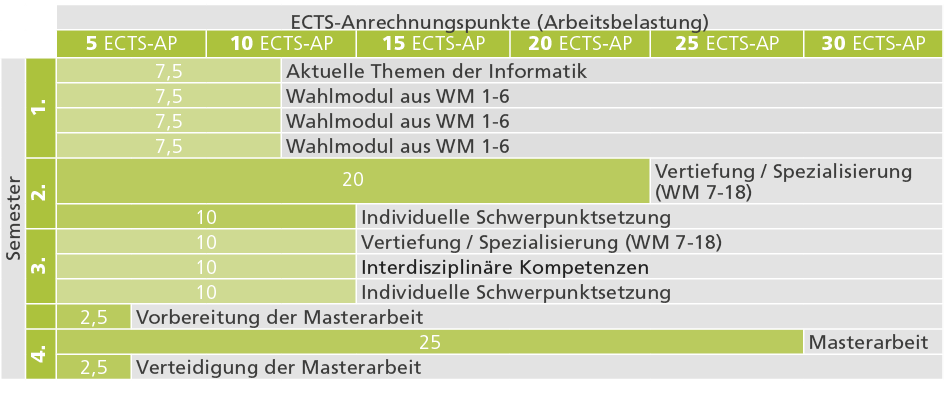Masterstudium Informatik
Curriculum (2021W)
Master of Science
Dauer/ECTS-AP
4 Semester / 120 ECTS-AP
Studienart
Vollzeit
Unterrichtssprache
Englisch
Voraussetzung
Fachlich infrage kommender Bachelorabschluss oder Äquivalent und Sprachnachweis
Fakultät
Fakultät für Mathematik, Informatik und Physik
Niveau der Qualifikation
Master (2. Studienzyklus)
ISCED-11: Stufe 7, EQR/NQR: Stufe 7
ISCED-F
0688 Interdisziplinäre Programme und Qualifikationen mit dem Schwerpunkt Informatik und Kommunikationstechnologie
Studienkennzahl
UC 066 921
Das Curriculum ist die Grundlage eines Studiums und vermittelt einen detaillierten Überblick zum Aufbau, zum Inhalt, zur Prüfungsordnung und zum Qualifikationsprofil.
Mittels Curriculum können mehrere wichtige Fragen bereits vor Studienbeginn geklärt werden: welche Zulassungsvoraussetzungen gelten für das Bachelorstudium Informatik , wie lange dauert das Studium, welche Module müssen absolviert werden etc.
Für das Masterstudium Informatik gilt aktuell das Curriculum 2021W.
Informationen zum Curriculum (2021W)
Die Gesamtfassung des Curriculum spiegelt das aktuell gültige Curriculum wider, ist rechtlich unverbindlich und dient lediglich der Information. Die rechtlich verbindliche Form des Curriculums inkl. etwaiger Änderungen finden Sie in den entsprechenden Mitteilungsblättern.
Die Information, welche Curriculumsversion für Sie gilt, entnehmen Sie bitte Ihrem Studienblatt
abrufbar unter: https://lfuonline.uibk.ac.at/public/lfuonline_meinestudien.studienblatt
Spalte: Curriculum in der geltenden Fassung
- Curriculum/Gesamtfassung (ab 01.10.2021)
- Mitteilungsblatt vom 18.05.2022, 42. Stück, Nr. 500 (Berichtigung des Curriculums)
- Mitteilungsblatt vom 01.09.2021, 102. Stück, Nr. 1030 (Berichtigung des Curriculums)
- Mitteilungsblatt vom 11.05.2021, 63. Stück, Nr. 748
Voraussetzung
Fachlich infrage kommendes Bachelorstudium an der Universität Innsbruck:
Durchlässigkeit zwischen österreichischen Bachelor-/Masterstudien:
http://www.informatikaustria.at/durchlaessigkeit/
Nachweis der Allgemeinen Universitätsreife:
Die allgemeine Universitätsreife für die Zulassung zu einem Masterstudium ist durch den Abschluss eines fachlich in Frage kommenden Bachelorstudiums, eines anderen fachlich in Frage kommenden Studiums mindestens desselben hochschulischen Bildungsniveaus an einer anerkannten inländischen oder ausländischen postsekundären Bildungseinrichtung oder eines im Curriculum des Masterstudiums definierten Studiums nachzuweisen. Zum Ausgleich wesentlicher fachlicher Unterschiede können Ergänzungsprüfungen (maximal 30 ECTS-AP) vorgeschrieben werden, die bis zum Ende des zweiten Semesters des Masterstudiums abzulegen sind. Das Rektorat kann festlegen, welche dieser Ergänzungsprüfungen Voraussetzung für die Ablegung von im Curriculum des Masterstudiums vorgesehenen Prüfungen sind.
Im Zuge des Nachweises der Allgemeinen Universitätsreife wird jedenfalls die Absolvierung folgender Kernbereiche im Rahmen des abgeschlossenen Bachelorstudiums geprüft:
- 25 ECTS-AP aus dem Kernbereich Programmiersprachen und Software Engineering
- 25 ECTS-AP aus dem Kernbereich Theoretische Informatik und Mathematik
- 25 ECTS-AP aus dem Kernbereich Systemarchitektur
- 25 ECTS-AP aus dem Kernbereich Angewandte Informatik
- 20 ECTS-AP aus einer Vertiefung
Empfohlener Studienverlauf
Der unten angeführte, exemplarische Studienverlauf gilt als Empfehlung für Vollzeitstudierende, die das Studium im Wintersemester beginnen. Die Aufstellung dient der Darstellung eines möglichen Studienablaufs und ist nicht verpflichtend. Etwaige Prüfungswiederholungen bzw. deren studienzeitverzögernde Wirkung sind nicht berücksichtigt.
Die Regelstudienzeit beträgt 4 Semester bzw. 120 ECTS-AP, wobei gemäß Universitätsgesetz die Arbeitsbelastung eines Studienjahres 1.500 (Echt-)Stunden zu betragen hat und dieser Arbeitsbelastung 60 Anrechnungspunkte zugeteilt werden (ein ECTS-Anrechnungspunkt entspricht einer Arbeitsbelastung der Studierenden von 25 Stunden).
7,5 ECTS-AP: Aktuelle Themen der Informatik
7,5 ECTS-AP: Wahlmodul aus WM 1-6
7,5 ECTS-AP: Wahlmodul aus WM 1-6
7,5 ECTS-AP: Wahlmodul aus WM 1-6
20,0 ECTS-AP: Vertiefung / Spezialisierung (WM 7-18)
10,0 ECTS-AP: Individuelle Schwerpunktsetzung
10,0 ECTS-AP: Vertiefung / Spezialisierung (WM 7-18)
10,0 ECTS-AP: Interdisziplinäre Kompetenzen
10,0 ECTS-AP: Individuelle Schwerpunktsetzung
2,5 ECTS-AP: Vorbereitung der Masterarbeit
25,0 ECTS-AP: Masterarbeit
2,5 ECTS-AP: Verteidigung der Masterarbeit
- Logik und Lernen
- Sicheres und verteiltes Rechnen
- Wahrnehmung, Interaktion und Robotik

Kursangebot der 3 Spezialisierungen: https://www.uibk.ac.at/informatik/master-computer-science/
Wahlpaket
Im Rahmen des Masterstudiums kann anstelle des Wahlmoduls Interdisziplinäre Kompetenzen und der Individuellen Schwerpunktsetzung ein Wahlpaket im Umfang von 30 ECTS-AP absolviert werden. Weiterführende Informationen bzw. eine Liste möglicher Wahlpakete sind abrufbar unter:
Erweiterung des Studiums
Im Rahmen dieses Studiums kann das Erweiterungsstudium Informatik im Umfang von 60 ECTS-AP absolviert werden. Die Zulassung zur Erweiterung setzt die Zulassung zu einem oder den bereits erfolgten Abschluss eines ausgewählten Studiums voraus. Weitere Informationen sind abrufbar unter: https://www.uibk.ac.at/studium/angebot/es-scientific-computing/
Informationen zur Prüfungsordnung inkl. Bewertung und Benotung
Prüfungsordnung
Die Prüfungsordnung ist integraler Bestandteil des Curriculums, detaillierte Informationen finden Sie unter dem Paragrafen Prüfungsordnung.
Bei der Notenverteilungsskala handelt es sich um die statistische Darstellung der Verteilung aller positiv absolvierten Prüfungen, die innerhalb eines Studiums bzw. eines Studienfaches (unter Heranziehung aller gemeldeten Studierenden eines Studiums bzw. eines Studienfaches) erfasst wurden. Die Notenverteilungsskala wird in regelmäßigen Abständen aktualisiert.
| A | B | C | D | E |
|---|---|---|---|---|
| Österreichische Notenskala | Definition | %-Satz | ||
| 1 | SEHR GUT: Hervorragende Leistung | = 100% | ||
| 2 | GUT: Generell gut, einige Fehler | |||
| 3 | BEFRIEDIGEND: Ausgewogen, Zahl entscheidender Fehler | |||
| 4 | GENÜGEND: Leistung entspricht den Minimalkriterien | |||
| 5 | NICHT GENÜGEND: Erhebliche Verbesserungen erforderlich, Erfordernis weiterer Arbeit |
wird aktualisiert
Gesamtbeurteilung der Qualifikation
Nicht zutreffend
Erklärung: Eine Gesamtbeurteilung (mit Auszeichnung bestanden, bestanden, nicht bestanden) wird nur über eine studienabschließende Prüfung, die aus mehr als einem Fach besteht, vergeben (im Curriculum dieses Studiums ist diese nicht vorgesehen).
Formulare
- Prüfungsprotokoll
- Anmeldung einer Masterarbeit
- Beurteilung des Pflichtmoduls: Vorbereitung Masterarbeit
- Deckblatt der Masterarbeit
- Eidesstattliche Erklärung (der Masterarbeit beifügen)
- Einreichung der Masterarbeit
- Sperre der Masterarbeit
- Antrag um Zulassung zur dritten und vierten Wiederholung einer Lehrveranstaltungsprüfung
Anerkennungen
Ansuchen um Anerkennung von PrüfungenUNDBeiblatt
Wichtig: Bitte beachten Sie, dass das Bearbeiten von Anerkennungsanträgen eine bestimmte Zeit in Anspruch nimmt und die Anerkennungen deshalb nicht unmittelbar nach Einreichung des Antrages im Prüfungsreferat im LFU:online ersichtlich sind.
Kontakt und Information
Prüfungsreferat
Standort Technikerstraße 17
Studienbeauftragter (ab 01.03.2024)
Univ.-Prof. Dr. Aart Middeldorp
Studiendekan (ab 01.03.2024)
Univ.-Prof. Dipl.-Math. Dr. Tim Netzer
Institut für Informatik
https://www.uibk.ac.at/informatik/studium/master
